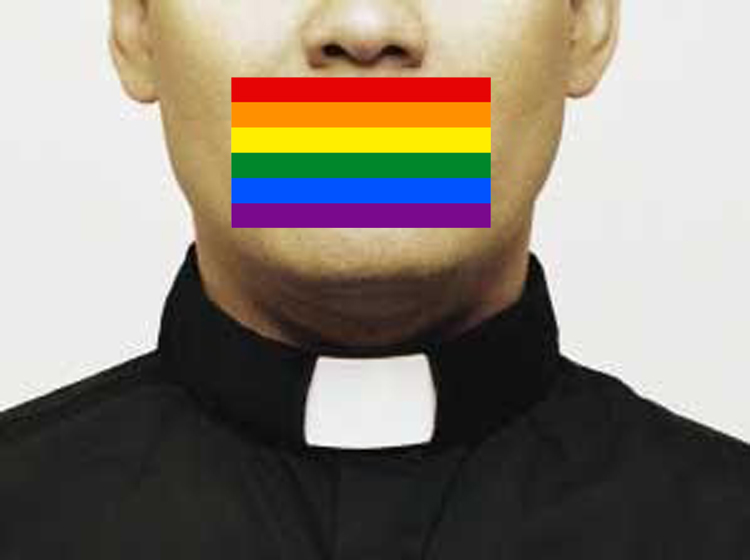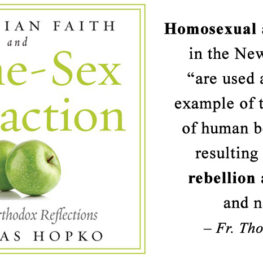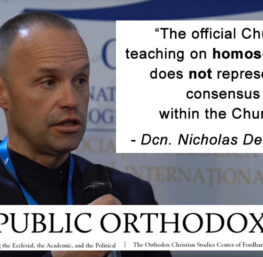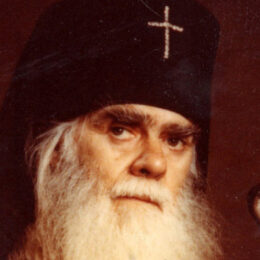 by Joseph Sciambra –
by Joseph Sciambra –
I will always be thankful to that priest – because, he was not afraid. Some would argue that he was about as un-pastoral as you can get: he named the sin, told me where it came from (the devil and hell itself) and then went about casting it out. It sounds harsh, but sometimes the most invasive forms of cancer require the most severe forms of therapy.
Leading up to and during the October Synod on the Family, countless pro-“gay Catholic” advocacy groups have sent out “calls for the harsh language of previous Vatican documents referring to LGBT people as ‘disordered’ to be rescinded.” Recently, even someone in the “Spiritual Friendship” group, a loose confederacy of self-proclaimed “gay” and chaste Catholics who have been embraced by some in the hierarchy, said this: “…we often stay away from the language of ‘disorder’ and ‘brokenness’ that often surrounds the issue.”
This line of reasoning is wholly supported by such prelates as, among others, Archbishop Mark Coleridge of Brisbane who proposed: “There has to be a whole new language … that would open up new doors and new possibilities.” What they want to replace it with, I have no idea; but I think it would be so diluted and weak as to appear “gay” affirming; the few stout and brave priests and prelates would be warned to – speak no evil; the rainbow flag as gag.
sometimes the most invasive forms of cancer require the most severe forms of therapy
This call to change, hinges on the false supposition that Catholic priests and bishops everywhere are calling homosexuals from the pulpit, or in the Confessional, “disordered.” As a life-long “Catholic,” though marginally one in my youth, and away from the Church as an adult for over ten years, I have never once heard a priest deliver a homily about homosexuality. For a few years, I even attended a parish run by the ultra-conservative Society of St. Pius X, and another by The Fraternity of St. Peter, and again, even from these traditional priests, homosexuality was only mentioned in brief passing as it related to the secular push for “gay marriage” and/or the increased acceptance of homosexual activity among the young.
in their sincere effort to not appear condemning, they inevitably come off as overly accepting.
Now, while “The Catechism of the Catholic Church” is quite clear about homosexuality and does use the term “disordered” the Catechism has never been a “gay” bestseller. Of the thousands of “gay” men that I have spoken with over the past few years – not one, has ever heard the word “disordered” as it relates to Catholicism and homosexuality. In addition, I have never encountered a priest or Bishop on a homophobic rampage. Apparently some believe, as “gay Catholic” speaker Ron Belgau voiced during his presentation at the Philadelphia Meeting of Families, that this incredibly hurtful language is being widely disseminated and therefore causing “great damage” to the homosexuals who may hear it. Ludicrous.
In my own experience, I have come across all sorts of priests who run the gamut with regards to the “gay” issue. Though, by far, I would testify that the vast majority are far from “gay” condemning, but actually “gay” supportive. And, what I mean by “gay” supportive, I am not accusing them of marching in the Gay Pride Parades of San Francisco, though some do that. But what they have done is to confuse compassion with collusion; because, in their sincere effort to not appear condemning, they inevitably come off as overly accepting.
I had made the wrong choices, and I hadn’t done my best, and I knew God was not okay with this.
In 1986, then Cardinal Ratzinger feared such a movement, when he stated: “an overly benign interpretation was given to the homosexual condition itself, some going so far as to call it neutral, or even good. Although the particular inclination of the homosexual person is not a sin, it is a more or less strong tendency ordered toward an intrinsic moral evil; and thus the inclination itself must be seen as an objective disorder.”
Actually, the first priest I ever spoke with, just after leaving the “gay” lifestyle, could certainly be regarded as someone the future Pope Benedict XVI was concerned about; for, he said that: “…this was something I did not choose,” “…that I had done my best,” and “…that God was okay with me being ‘gay’.” Adding one more caveat: “…that I needed to be more careful.” Then I didn’t know much, but I instinctively knew he was wrong. Because, simply – I had lived it: I had made the wrong choices, and I hadn’t done my best, and I knew God was not okay with this.
The second priest I spoke with was humble and kind, fully aware that homosexuality was not an option – in any way, but he was also very reticent to give advice. I think this was partially due to the fact that counseling a recovering “gay” man was widely outside his experience. I think that, he didn’t not want to offend me – telling me just that: that he was scared of saying the wrong thing. Therefore, our conversation always centered on chastity; though a noble and beautiful pursuit, I needed something more.
Suddenly, out of nowhere, I met a newly ordained priest, not that much older than me. He was considerate and thoughtful, but he was fearless and brash. And he had something to say and I needed to hear it. Until that point, on my own, mostly by reading the works of Fr. John Harvey and Dr. Joseph Nicolosi, I had come to understand that my swerve into homosexuality truly emerged out of a highly confused, traumatized, and yes “disordered,” mind. Only this priest, told me that there was another aspect to all of this – the spiritual or the demonic.
I will always be thankful to that priest – because, he was not afraid.
He said I very much needed a tri-fold healing: of the body, the mind, and the spirit. The various surgeries I had to endure in order to repair the damage of homosexuality was taking care of the body, albeit painfully. With a good Catholic therapist I was taking care of the mind. Now it was time to heal the spirit.
First off, telling someone you just met, as Father did with me – that you are under demonic influence, would go against every “pastoral” theory put forth by the “gay” Catholic league and their supporters in the Church. Only, it was exactly what I indeed to know. Because, I was like some wandering pathetic sick person constantly searching out a cure: one doctor tells me to embrace the disease and accept it, another tells me to just endure it, while, finally, the third one offers a treatment.
I will always be thankful to that priest – because, he was not afraid. Some would argue that he was about as un-pastoral as you can get: he named the sin, told me where it came from (the devil and hell itself) and then went about casting it out. It sounds harsh, but sometimes the most invasive forms of cancer require the most severe forms of therapy. St. Josemaria Escriva said: “To heal a wound, the first thing to do is to clean it well, including a wide area around it. The surgeon knows that the cleaning hurts, but he also knows that there will be worse pain later if it is not done.” He was talking about sin.
That’s what this priest did for me…He respected and loved me enough – to tell the Truth.
The much maligned word “disordered” works in sort of the same way, though I think even harsher language should be used; as we need peroxide poured on your wounds…something that will burn and sting our ears…and our complacency. And, continuing upon this analogy, if you went to a physician with a serious life-threatening illness, would you want him to tell you the truth about your condition, as unpleasant as it may be, or would you want him to play mind games with you? No! You would want to know: what do I have and what do I need to do in order to survive this?
That’s what this priest did for me…He respected and loved me enough – to tell the Truth. Probably, the greatest voice yet to emerge from the Synod is not one of the egotistical Cardinal heavyweights from Western Europe. But a seemingly inconsequential prelate from a Hungarian backwater, Archbishop Fülöp Kocsis, Metropolitan Archbishop of the Archeparchy of Hajdúdorog stated: “We must call these diabolic forces which have a role to play with these phenomena by name because this way we can find some indications even for the research of possible solutions.”
__________________________________________
Joseph Sciambra is a former homosexual who now embraces Christ and is working to help other homosexuals repent and return to God. (NOTE: Brief sentence structure and grammar edits made to improve readability.



